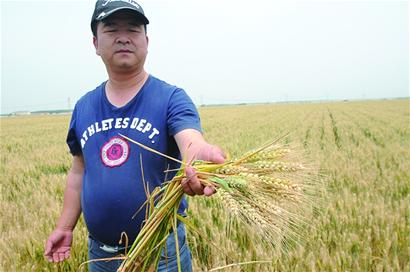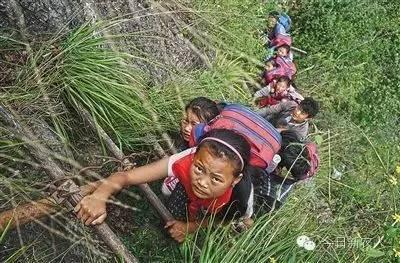Four years of returning home to start a business is about to usher in a bumper harvest. Huangmaoya's peaches are red.
The branches and leaves are covered, and the white peaches on the branches grow red. "in half a month, we will be on the market." On the morning of May 31, Luo Hong stood on the edge of the peach forest with a hoe, smiling. He and a group of fellow villagers returned to their hometown to start a business for four years and are about to have a bumper harvest.
This is Junzhai Village, Huangmao Township, Cangxi County, 104 kilometers away from the county seat, and the only road leading to the county seat takes 4 hours. Many mountains, deep ditches and poverty are the labels here. Four years ago, Luo Hong, who worked hard in Chengdu for 15 years, led a group of people to return home to start a business, investing in building roads, building modern agricultural industrial parks, developing red tourism, and so on.
Go back to your hometown to start a business: grow peaches and promote tourism
"what do you want to do when you want to go back to that poor corner again?" In early 2012, when Luo Hong, 47, was ready to return to his hometown to start a business, his wife and parents objected. But Luo Hong's idea is very simple: it would be a pity not to develop such a good ecological environment and red tourism resources in his hometown.
He invited experts from the Provincial Academy of Agricultural Sciences to investigate and found that the soil and climate here are very suitable for growing "peaches," crispy peaches and kiwifruit. As soon as you say it, 200 hectares of land will be transferred in advance, including 80 hectares of crispy peaches, 20 hectares of ornamental fruits, 20 hectares of kiwifruit, and 80 hectares of white meat loquat, of which 50% are owned by villagers with land and labor, 10% by experts and technology of the Provincial Academy of Agricultural Sciences, and 40% by cash from Luo Hong and several other returning entrepreneurs. "I bought 6 mu of land in my family and planted kiwifruit, with an income of more than 30,000 yuan last year." Wang Chaoguang, a villager of the second group of Junzhai Village, said that if he grows corn, wheat and miscellaneous grains, his annual income of 10,000 yuan would be good. Today, the agricultural industrial park has attracted thousands of farmers around to work, with a per capita annual income ranging from thousands to tens of thousands of yuan.
With the development of green industry, red tourism should also keep up. In 1934, Xu Qian and Li Xiannian commanded the famous "Huangmaoya Battle" here. With the help of the planning of the local government, Luo Hong, together with several fellow villagers, invested in renovating the Huangmaoya battle site and the Martyrs' Mausoleum, built a new Red Army Park of 3000 square meters, built a Red Army Square of tens of thousands of square meters, and built two new irrigation and sightseeing Weirs, which are named Red Army Weirs.
There are "red" and "green", how to attract guests? Luo Hong invested 10 million yuan to build a 14.6km expressway, called Red Army Road, from the exit of the nearest Guangba Expressway Wangcangmu Station, connecting to agricultural parks, tourist attractions and Tongxian highway. In March this year, the Seventh Rural Culture and Tourism Festival in Sichuan Province set up a branch venue in Huangmao Township, and thousands of tourists poured in, driving more farmers along the road.
Drive fellow-townsmen: make rural tourism bigger
In Luo Hong's car, there is a CD that plays three songs in a loop, "Huangmaoya Battle Song", "colorful Huangmaoya" and "Yellow Cat Man's Great Road". The beautiful melody is intoxicating. This is Luo Hong invited music professionals to the yellow cat style creation.
He also asked someone to make a picture album and made a video of "good scenery of the Yellow Cat" at his own expense to actively promote his hometown. In the WeChat group of the Huangmaoya Chamber of Commerce he founded, he often saw pictures and videos of his hometown, which attracted "likes" from fellow villagers in Zhejiang, Beijing, Guangdong and other places. In May last year, Luo Hong gathered more than 120 successful Huangmaoya entrepreneurs to set up the Huangmaoya Chamber of Commerce with the support of the County Federation of Industry and Commerce, which became a platform for fellow villagers to exchange information and return to their hometown to start a business.
"Luo Hong's influence has led a group of fellow villagers to return to their hometown to start their own businesses." Ke Xiong, party committee secretary of Huangmao Township, said. Luo Hong has been doing stone business in Chengdu, successively taking out more than 100 people, most of them became rich with their "stone rice" families, and then scattered to other places to operate. Led by Luo Hong, nine fellow villagers have returned home to start their own businesses, of which Luo Hong personally invested nearly 60 million yuan. Under the guidance of the local government, Luo Hong and a group of fellow villagers are now planning to build tourist reception centers and star-rated rural hotels to expand rural tourism.
Related
- A course of planting techniques and methods on how to grow carrots
- How to plant the latest tulips?
- Is it better to pick tea in the morning or in the afternoon? When is the best time for tea to be picked? what is the third or fifth tea?
- Launch Yuanxiao Happy combination Haocha + Tea Yuan healthy Taste
- Penghu Tourism "Fireworks 20 Parade with You"
- 2022 West Lake Happiness holds "Digital Revitalization Voucher" and draws iphone13 and laptop.
- Banqiao Fuzhou social houses are designed to change start-up combined with police elimination to create a safe and livable environment
- The convenient measure of "mechanical weeding" in Xinbei has been abused and the Agriculture Bureau has imposed heavy penalties on the illegal land consolidation.
- Changgeng University Joins Hands with Four Memory Factories to Rescue Memory Talent Shortage
- The list of Taiwan's top 100 MVP managers is listed by the Director-General of the Farmers' Association of Sanxia District.



